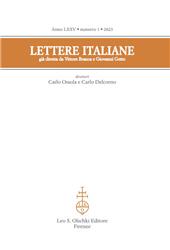Giulio Strozzi (1583-1652) : drammaturgo, poeta, librettista e... 'libertino'
P. 10-26
Dopo aver brevemente introdotto i problemi inerenti all'uso del termine ‘libertino', viene riconsiderato il contributo di alcuni membri di punta della veneziana Accademia degli Incogniti, spesso presentata come ‘libertina', al teatro musicale ‘mercenario'. Viene poi preso in esame il contributo al teatro, non solo musicale, dato dallo Strozzi. Per quel che riguarda il teatro parlato, ci si sofferma sul Natal di Amore (1621), in particolare sulla versione ampliata e arricchita del 1629, contenente molte scene e personaggi supplementari dalla forte carica ‘libertineggiante'. In seguito vengono presi in considerazione passi e scene dei suoi libretti per drammi musicali caratterizzati da prese di posizione, soprattutto da parte delle protagoniste femminili, anch'esse ascrivibili per molti aspetti ad atteggiamenti ‘libertini'.
E proprio questo particolare accento su ardite e forti figure femminili, connotate quasi sempre positivamente, permette di individuare nel teatro musicale e non di Strozzi, tracce fortemente libertine prive però di quella carica misogina caratterizzante l'opera di altri Incogniti. [Testo dell'editore]
After briefly introducing the problems inherent in the use of the term ‘libertine', the contribution of some leading members of the Venetian Accademia degli Incogniti, often portrayed as libertine, to commercial musical theatre is re-examined, before shifting the attention on Giulio Strozzi's contribution to spoken and musical theatre. As far as spoken theatre is concerned, the focus is placed on Il natal di Amore (1621), in particular on the enlarged and expanded version of 1629, containing many additional scenes and characters with a strong ‘libertinesque' charge. Next, passages and scenes from his librettos for musical dramas characterised by stances, especially on the part of the female protagonists, also attributable in many respects to ‘libertine' attitudes, are considered.
It is precisely this particular emphasis on bold and strong female figures, nearly always positively connoted, that makes it possible to identify in Strozzi's musical and spoken theatre, strongly libertine traces that are, however, devoid of the misogynistic overtones that characterise the work of other Incogniti. [Publisher's text]
Fa parte di
Lettere italiane : LXXV, 1, 2023-
Articoli dello stesso fascicolo (disponibili singolarmente)
-
Informazioni
Codice DOI: 10.1400/292895
ISSN: 2035-6315


